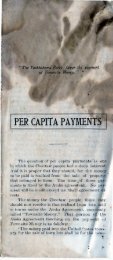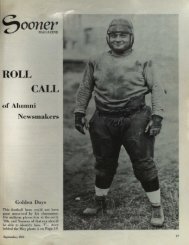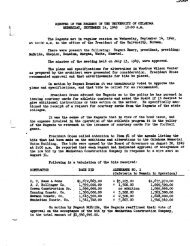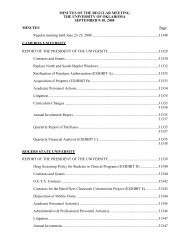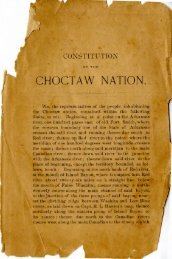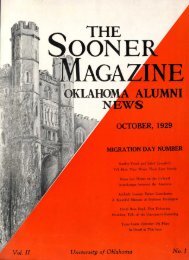- Page 1 and 2:
MINUTES OF A REGULAR MEETINGTHE UNI
- Page 3 and 4:
Athletic Ticket Scanning Software .
- Page 7 and 8:
June 22-23, 2004 29135B. Rogers Sta
- Page 9 and 10:
June 22-23, 2004 29137The design de
- Page 11 and 12:
June 22-23, 2004 29139LAW ENFORCEME
- Page 13 and 14:
June 22-23, 2004 29141The federal D
- Page 15 and 16:
June 22-23, 2004 29143Any fundraisi
- Page 17 and 18:
June 22-23, 2004 29145from the Roge
- Page 19 and 20:
June 22-23, 2004 29147SCHOOL OF LIB
- Page 21 and 22:
June 22-23, 2004 29149tuition rates
- Page 23 and 24:
June 22-23, 2004 29151Academic Faci
- Page 25 and 26:
June 22-23, 2004 29153DISTRICT IIJe
- Page 29 and 30:
June 22-23, 2004 29157Biomedical Re
- Page 31 and 32:
June 22-23, 2004 29159NON-SUBSTANTI
- Page 34 and 35:
June 22-23, 2004 29162A copy of the
- Page 36 and 37:
June 22-23, 2004 29164The Legislati
- Page 38 and 39:
June 22-23, 2004 29166interceptor p
- Page 40 and 41:
June 22-23, 2004 29168Several types
- Page 42 and 43:
June 22-23, 2004 29170CONTINUATION
- Page 45 and 46:
June 22-23, 2004 29173APPOINTMENT O
- Page 49 and 50:
June 22-23, 2004 29177proud to serv
- Page 51 and 52:
June 22-23, 2004 29179ESTABLISHMENT
- Page 53 and 54:
June 22-23, 2004 29181Department wa
- Page 55 and 56:
June 22-23, 2004 29183amount, withi
- Page 57 and 58:
June 22-23, 2004 29185Rick Hart, As
- Page 59 and 60:
June 22-23, 2004 291871.2 General C
- Page 61 and 62:
June 22-23, 2004 29189c) If there i
- Page 63 and 64:
June 22-23, 2004 29191the quotient
- Page 65 and 66:
June 22-23, 2004 29193President Bor
- Page 67 and 68:
June 22-23, 2004 29195• Total ava
- Page 69 and 70:
June 22-23, 2004 291977 HSC -Testin
- Page 71 and 72:
June 22-23, 2004 2919918 NC - Frami
- Page 73 and 74:
June 22-23, 2004 29201CUMULATIVE TO
- Page 75 and 76:
June 22-23, 2004 29203LEASE OF REAL
- Page 77 and 78:
June 22-23, 2004 29205Malke, Horst,
- Page 79 and 80:
June 22-23, 2004 29207Archer, Ann G
- Page 81 and 82:
June 22-23, 2004 29209Yount, Brian
- Page 83 and 84:
June 22-23, 2004 29211White, Kathry
- Page 85 and 86:
June 22-23, 2004 29213Magsig, Micha
- Page 87 and 88:
June 22-23, 2004 29215Wang, Yunheng
- Page 89 and 90:
June 22-23, 2004 29217Pham, Ngoc Tr
- Page 91 and 92:
June 22-23, 2004 29219Forren, Harry
- Page 93 and 94:
June 22-23, 2004 29221Rothoff, Rodn
- Page 95 and 96:
June 22-23, 2004 292233) change his
- Page 97 and 98:
June 22-23, 2004 29225Schmidt, Jerr
- Page 99 and 100:
June 22-23, 2004 29227LITIGATIONThi
- Page 101 and 102:
June 22-23, 2004 29229CAMERON UNIVE
- Page 103 and 104:
June 22-23, 2004 29231Substantially
- Page 105 and 106:
June 22-23, 2004 29233sessions, stu
- Page 107 and 108:
June 22-23, 2004 29235fee. As noted
- Page 109 and 110:
June 22-23, 2004 29237committee. Pr
- Page 111 and 112:
June 22-23, 2004 292394.14.1—Sele
- Page 113 and 114:
June 22-23, 2004 29241programming,
- Page 115 and 116:
June 22-23, 2004 29243SCHEDULE 1 CU
- Page 117 and 118:
June 22-23, 2004 29245Bachelor, Joh
- Page 119 and 120:
June 22-23, 2004 29247LITIGATIONThi
- Page 121 and 122:
Agreement between the Commissioner
- Page 123 and 124:
June 22-23, 200413. This Agreement
- Page 125 and 126:
June 22-23, 20044.4.6—Legal Actio
- Page 127 and 128:
REGENTS’ POLICY MANUALSECTION 2
- Page 129 and 130:
REGENTS’ POLICY MANUALSECTION 2
- Page 131 and 132:
REGENTS’ POLICY MANUALSECTION 2
- Page 133 and 134:
REGENTS’ POLICY MANUALSECTION 2
- Page 135 and 136:
REGENTS’ POLICY MANUALSECTION 2
- Page 137 and 138:
REGENTS’ POLICY MANUALSECTION 2
- Page 139 and 140:
REGENTS’ POLICY MANUALSECTION 2
- Page 141 and 142:
REGENTS’ POLICY MANUALSECTION 2
- Page 143 and 144:
REGENTS’ POLICY MANUALSECTION 2
- Page 145 and 146:
REGENTS’ POLICY MANUALSECTION 2
- Page 147 and 148:
REGENTS’ POLICY MANUALSECTION 2
- Page 149 and 150:
REGENTS’ POLICY MANUALSECTION 2
- Page 151 and 152:
REGENTS’ POLICY MANUALSECTION 2
- Page 153 and 154:
REGENTS’ POLICY MANUALSECTION 2
- Page 155 and 156:
REGENTS’ POLICY MANUALSECTION 2
- Page 157 and 158:
REGENTS’ POLICY MANUALSECTION 2
- Page 159 and 160:
REGENTS’ POLICY MANUALSECTION 2
- Page 161 and 162:
REGENTS’ POLICY MANUALSECTION 2
- Page 163 and 164:
REGENTS’ POLICY MANUALSECTION 2
- Page 165 and 166:
REGENTS’ POLICY MANUALSECTION 2
- Page 167 and 168:
REGENTS’ POLICY MANUALSECTION 2
- Page 169 and 170:
REGENTS’ POLICY MANUALSECTION 2
- Page 171 and 172:
REGENTS’ POLICY MANUALSECTION 2
- Page 173 and 174:
REGENTS’ POLICY MANUALSECTION 2
- Page 175 and 176:
REGENTS’ POLICY MANUALSECTION 2
- Page 177 and 178:
REGENTS’ POLICY MANUALSECTION 2
- Page 179 and 180:
REGENTS’ POLICY MANUALSECTION 2
- Page 181 and 182:
REGENTS’ POLICY MANUALSECTION 2
- Page 183 and 184:
REGENTS’ POLICY MANUALSECTION 2
- Page 185 and 186:
REGENTS’ POLICY MANUALSECTION 2
- Page 187 and 188:
REGENTS’ POLICY MANUALSECTION 2
- Page 189 and 190:
REGENTS’ POLICY MANUALSECTION 2
- Page 191 and 192:
REGENTS’ POLICY MANUALSECTION 2
- Page 193 and 194:
REGENTS’ POLICY MANUALSECTION 2
- Page 195 and 196:
REGENTS’ POLICY MANUALSECTION 2
- Page 197 and 198:
REGENTS’ POLICY MANUALSECTION 2
- Page 199 and 200:
REGENTS’ POLICY MANUALSECTION 2
- Page 201 and 202:
REGENTS’ POLICY MANUALSECTION 2
- Page 203 and 204:
REGENTS’ POLICY MANUALSECTION 2
- Page 205 and 206:
REGENTS’ POLICY MANUALSECTION 2
- Page 207 and 208: REGENTS’ POLICY MANUALSECTION 2
- Page 209 and 210: REGENTS’ POLICY MANUALSECTION 2
- Page 211 and 212: REGENTS’ POLICY MANUALSECTION 2
- Page 213 and 214: REGENTS’ POLICY MANUALSECTION 2
- Page 215 and 216: REGENTS’ POLICY MANUALSECTION 2
- Page 217 and 218: REGENTS’ POLICY MANUALSECTION 2
- Page 219 and 220: REGENTS’ POLICY MANUALSECTION 2
- Page 221 and 222: REGENTS’ POLICY MANUALSECTION 2
- Page 223 and 224: REGENTS’ POLICY MANUALSECTION 2
- Page 225 and 226: REGENTS’ POLICY MANUALSECTION 2
- Page 227 and 228: REGENTS’ POLICY MANUALSECTION 2
- Page 229 and 230: REGENTS’ POLICY MANUALSECTION 2
- Page 231 and 232: REGENTS’ POLICY MANUALSECTION 2
- Page 233 and 234: REGENTS’ POLICY MANUALSECTION 2
- Page 235 and 236: REGENTS’ POLICY MANUALSECTION 2
- Page 237 and 238: REGENTS’ POLICY MANUALSECTION 2
- Page 239 and 240: REGENTS’ POLICY MANUALSECTION 2
- Page 241 and 242: REGENTS’ POLICY MANUALSECTION 2
- Page 243 and 244: REGENTS’ POLICY MANUALSECTION 2
- Page 245 and 246: REGENTS’ POLICY MANUALSECTION 2
- Page 247 and 248: REGENTS’ POLICY MANUALSECTION 2
- Page 249 and 250: REGENTS’ POLICY MANUALSECTION 2
- Page 251 and 252: REGENTS’ POLICY MANUALSECTION 2
- Page 253 and 254: REGENTS’ POLICY MANUALSECTION 2
- Page 255 and 256: REGENTS’ POLICY MANUALSECTION 2
- Page 257: REGENTS’ POLICY MANUALSECTION 2
- Page 261 and 262: REGENTS’ POLICY MANUALSECTION 2
- Page 263 and 264: REGENTS’ POLICY MANUALSECTION 2
- Page 265 and 266: REGENTS’ POLICY MANUALSECTION 2
- Page 267 and 268: REGENTS’ POLICY MANUALSECTION 2
- Page 269 and 270: REGENTS’ POLICY MANUALSECTION 2
- Page 271 and 272: REGENTS’ POLICY MANUALSECTION 2
- Page 273 and 274: REGENTS’ POLICY MANUALSECTION 2
- Page 275 and 276: REGENTS’ POLICY MANUALSECTION 2
- Page 277 and 278: REGENTS’ POLICY MANUALSECTION 2
- Page 279 and 280: REGENTS’ POLICY MANUALSECTION 2
- Page 281 and 282: REGENTS’ POLICY MANUALSECTION 2
- Page 283 and 284: REGENTS’ POLICY MANUALSECTION 2
- Page 285 and 286: REGENTS’ POLICY MANUALSECTION 3
- Page 287 and 288: REGENTS’ POLICY MANUALSECTION 3
- Page 289 and 290: REGENTS’ POLICY MANUALSECTION 3
- Page 291 and 292: REGENTS’ POLICY MANUALSECTION 3
- Page 293 and 294: REGENTS’ POLICY MANUALSECTION 3
- Page 295 and 296: REGENTS’ POLICY MANUALSECTION 3
- Page 297 and 298: REGENTS’ POLICY MANUALSECTION 3
- Page 299 and 300: REGENTS’ POLICY MANUALSECTION 3
- Page 301 and 302: REGENTS’ POLICY MANUALSECTION 3
- Page 303 and 304: REGENTS’ POLICY MANUALSECTION 3
- Page 305 and 306: REGENTS’ POLICY MANUALSECTION 3
- Page 307 and 308: REGENTS’ POLICY MANUALSECTION 3
- Page 309 and 310:
REGENTS’ POLICY MANUALSECTION 3
- Page 311 and 312:
REGENTS’ POLICY MANUALSECTION 3
- Page 313 and 314:
REGENTS’ POLICY MANUALSECTION 3
- Page 315 and 316:
REGENTS’ POLICY MANUALSECTION 3
- Page 317 and 318:
REGENTS’ POLICY MANUALSECTION 3
- Page 319 and 320:
REGENTS’ POLICY MANUALSECTION 3
- Page 321 and 322:
REGENTS’ POLICY MANUALSECTION 3
- Page 323 and 324:
REGENTS’ POLICY MANUALSECTION 3
- Page 325 and 326:
REGENTS’ POLICY MANUALSECTION 3
- Page 327 and 328:
REGENTS’ POLICY MANUALSECTION 3
- Page 329 and 330:
REGENTS’ POLICY MANUALSECTION 3
- Page 331 and 332:
REGENTS’ POLICY MANUALSECTION 3
- Page 333 and 334:
REGENTS’ POLICY MANUALSECTION 3
- Page 335 and 336:
REGENTS’ POLICY MANUALSECTION 3
- Page 337 and 338:
REGENTS’ POLICY MANUALSECTION 3
- Page 339 and 340:
REGENTS’ POLICY MANUALSECTION 3
- Page 341 and 342:
REGENTS’ POLICY MANUALSECTION 4
- Page 343 and 344:
REGENTS’ POLICY MANUALSECTION 4
- Page 345 and 346:
REGENTS’ POLICY MANUALSECTION 4
- Page 347 and 348:
REGENTS’ POLICY MANUALSECTION 4
- Page 349 and 350:
REGENTS’ POLICY MANUALSECTION 4
- Page 351 and 352:
REGENTS’ POLICY MANUALSECTION 4
- Page 353 and 354:
REGENTS’ POLICY MANUALSECTION 4
- Page 355 and 356:
REGENTS’ POLICY MANUALSECTION 4
- Page 357 and 358:
REGENTS’ POLICY MANUALSECTION 4
- Page 359 and 360:
REGENTS’ POLICY MANUALSECTION 4
- Page 361 and 362:
REGENTS’ POLICY MANUALSECTION 4
- Page 363 and 364:
REGENTS’ POLICY MANUALSECTION 4
- Page 365 and 366:
REGENTS’ POLICY MANUALSECTION 4
- Page 367 and 368:
REGENTS’ POLICY MANUALSECTION 4
- Page 369 and 370:
REGENTS’ POLICY MANUALSECTION 4
- Page 371 and 372:
REGENTS’ POLICY MANUALSECTION 4
- Page 373 and 374:
REGENTS’ POLICY MANUALSECTION 4
- Page 375 and 376:
REGENTS’ POLICY MANUALSECTION 4
- Page 377 and 378:
REGENTS’ POLICY MANUALSECTION 4
- Page 379 and 380:
REGENTS’ POLICY MANUALSECTION 4
- Page 381 and 382:
REGENTS’ POLICY MANUALSECTION 4
- Page 383 and 384:
REGENTS’ POLICY MANUALSECTION 4
- Page 385 and 386:
REGENTS’ POLICY MANUALSECTION 5
- Page 387 and 388:
REGENTS’ POLICY MANUALSECTION 5
- Page 389 and 390:
REGENTS’ POLICY MANUALSECTION 5
- Page 391 and 392:
REGENTS’ POLICY MANUALSECTION 5
- Page 393 and 394:
REGENTS’ POLICY MANUALSECTION 5
- Page 395 and 396:
REGENTS’ POLICY MANUALSECTION 5
- Page 397 and 398:
REGENTS’ POLICY MANUALSECTION 5
- Page 399 and 400:
REGENTS’ POLICY MANUALSECTION 5
- Page 401 and 402:
REGENTS’ POLICY MANUALSECTION 5
- Page 403 and 404:
REGENTS’ POLICY MANUALSECTION 5
- Page 405 and 406:
REGENTS’ POLICY MANUALSECTION 5
- Page 407 and 408:
REGENTS’ POLICY MANUALSECTION 6
- Page 409 and 410:
REGENTS’ POLICY MANUALSECTION 6
- Page 411 and 412:
REGENTS’ POLICY MANUALSECTION 6
- Page 413 and 414:
REGENTS’ POLICY MANUALSECTION 6
- Page 415 and 416:
REGENTS’ POLICY MANUALSECTION 6
- Page 417 and 418:
REGENTS’ POLICY MANUALSECTION 6
- Page 419 and 420:
REGENTS’ POLICY MANUALSECTION 6
- Page 421 and 422:
REGENTS’ POLICY MANUALSECTION 6
- Page 423 and 424:
REGENTS’ POLICY MANUALSECTION 6
- Page 425 and 426:
REGENTS’ POLICY MANUALSECTION 6
- Page 427 and 428:
REGENTS’ POLICY MANUALSECTION 6
- Page 429 and 430:
REGENTS’ POLICY MANUALSECTION 7 -
- Page 431 and 432:
REGENTS’ POLICY MANUALSECTION 7 -
- Page 433 and 434:
REGENTS’ POLICY MANUALSECTION 7 -
- Page 435 and 436:
REGENTS’ POLICY MANUALSECTION 7 -
- Page 437 and 438:
REGENTS’ POLICY MANUALSECTION 7 -
- Page 439 and 440:
REGENTS’ POLICY MANUALSECTION 7 -
- Page 441 and 442:
REGENTS’ POLICY MANUALSECTION 7 -
- Page 443 and 444:
REGENTS’ POLICY MANUALSECTION 7 -
- Page 445 and 446:
REGENTS’ POLICY MANUALSECTION 7 -
- Page 447 and 448:
REGENTS’ POLICY MANUALSECTION 7 -
- Page 449 and 450:
REGENTS’ POLICY MANUALSECTION 7 -
- Page 451 and 452:
REGENTS’ POLICY MANUALSECTION 7 -
- Page 453 and 454:
THE UNIVERSITY OF OKLAHOMAJune 22-2
- Page 455 and 456:
THE UNIVERSITY OF OKLAHOMAJune 22-2
- Page 457 and 458:
THE UNIVERSITY OF OKLAHOMAJune 22-2
- Page 459 and 460:
THE UNIVERSITY OF OKLAHOMAJune 22-2
- Page 461 and 462:
AWARDNO.AGENCYTITLEVALUEPERIODPI(S)
- Page 463 and 464:
AWARDNO.AGENCYTITLEVALUEPERIODPI(S)
- Page 465:
The authority and responsibility of
- Page 468 and 469:
June 22-23, 2004REGENTS’ FUNDQUAR
- Page 470 and 471:
June 22-23, 2004• CIF Performance
- Page 472 and 473:
June 22-23, 2004IV.Short Term Inves
- Page 474 and 475:
June 22-23, 2004• A gift from the
- Page 476 and 477:
June 22-23, 2004QUARTERLY FINANCIAL
- Page 478 and 479:
June 22-23, 2004Expenditures by Org
- Page 480 and 481:
June 22-23, 2004Health Sciences Cen
- Page 484 and 485:
June 22-23, 2004CAMERON UNIVERSITYS
- Page 486 and 487:
June 22-23, 20048. Benefits and pro
- Page 488 and 489:
ContactsJune 22-23, 2004I. Sick Lea
- Page 490 and 491:
Cameron UniversitySchedule 2CUState
- Page 492 and 493:
Cameron UniversitySchedule 4.1CUSta
- Page 494 and 495:
Cameron UniversitySchedule 4.3CUSta
- Page 496:
Cameron UniversitySchedule 4CUState



